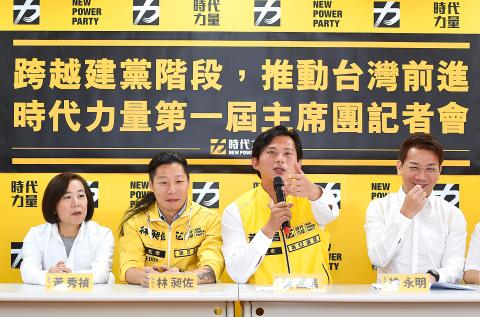The New Power Party (NPP) yesterday announced its new leadership lineup — a seven-member board of chairpersons that it said could prevent abuse of power and encourage participatory democracy — and vowed to win 10 percent of the at-large vote in January’s legislative elections.
The chairpersons are the party’s three legislative candidates — Academia Sinica researcher Huang Kuo-chang (黃國昌), musician Freddy Lim (林昶佐) and author/playwright Neil Peng (馮光遠) — Soochow University political science professor Hsu Yung-ming (徐永明), lawyers Huang Hsiu-chen (黃秀禎) and Lin Feng-jeng (林?正) and author Lin Shih-yu (林世煜).
They were elected last week by 427 party members through an online poll, with Huang Kuo-chang topping the poll with a 76.11 percent support rate.

Photo: Liao Chen-huei, Taipei Times
The new board yesterday held its first meeting, during which Huang Kuo-chang was elected NPP executive chairman.
Hsu said the party’s Decision-making Committee would consist of the seven-member board and eight members from the party’s executive and policy committees, which would prevent authoritarian rule by a single chairperson and encourage direct participation of party members.
Traditionally, when in office, the Chinese Nationalist Party (KMT) and the Democratic Progressive Party have had the president also serve as the party’s chairperson, which allows the president to interfere with the legislature by manipulating party affairs and reduces the legislature’s oversight power, Haung Kuo-chang said.
“I would not become a permanent executive chairperson, as elections for the board of chairpersons is to be held after each major national poll or when one-sixth of the party members demand it.” Huang Kuo-chang said.
“There will be another election after the legislative polls next year,” he said.
The NPP’s executive chairperson is to act as the party’s spokesperson, and would not have the power to control the distribution of resources or party administration, he said, adding different policy committees are to be formed along the lines of the Legislative Yuan’s committees.
He said the party plans to announce the rest of its candidates for district legislative seats as well as a slate of at-large candidates by the end of the month.
Participation by non-member voters would be factored in the selection and ranking of the NPP’s at-large candidates, as candidates have to seek mandate by communicating with local constituents about the NPP’s objectives and the priority bills they would push for if elected, before the party conducts an online poll to gauge the various hopefuls’ support rates, Haung Kuo-chang said.
That would provide voters with the opportunity to directly participate in the NPP’s decisionmaking process, he said.
The NPP has a support rate of about 10 percent in Taipei and New Taipei City, which it expects could translate into votes, he said.

ANOTHER EMERGES: The CWA yesterday said this year’s fourth storm of the typhoon season had formed in the South China Sea, but was not expected to affect Taiwan Tropical Storm Gaemi has intensified slightly as it heads toward Taiwan, where it is expected to affect the country in the coming days, the Central Weather Administration (CWA) said yesterday. As of 8am yesterday, the 120km-radius storm was 800km southeast of Oluanpi (鵝鑾鼻), Taiwan’s southernmost tip, moving at 9kph northwest, the agency said. A sea warning for Gaemi could be issued tonight at the earliest, it said, adding that the storm is projected to be closest to Taiwan on Wednesday or Thursday. Gaemi’s potential effect on Taiwan remains unclear, as that would depend on its direction, radius and intensity, forecasters said. Former Weather Forecast

As COVID-19 cases in Japan have been increasing for 10 consecutive weeks, people should get vaccinated before visiting the nation, the Centers for Disease Control (CDC) said. The centers reported 773 hospitalizations and 124 deaths related to COVID-19 in Taiwan last week. CDC Epidemic Intelligence Center Director Guo Hung-wei (郭宏偉) on Tuesday said the number of weekly COVID-19 cases reported in Japan has been increasing since mid-May and surpassed 55,000 cases from July 8 to July 14. The average number of COVID-19 patients at Japan’s healthcare facilities that week was also 1.39 times that of the week before and KP.3 is the dominant

The Chinese Communist Party’s (CCP) working group for Taiwan-related policies is likely to be upgraded to a committee-level body, a report commissioned by the Mainland Affairs Council (MAC) said. As Chinese President Xi Jinping (習近平) is increasingly likely to upgrade the CCP’s Central Leading Group for Taiwan Affairs, Taiwanese authorities should prepare by researching Xi and the CCP, the report said. At the third plenary session of the 20th Central Committee of the CCP, which ended on Thursday last week, the party set a target of 2029 for the completion of some tasks, meaning that Xi is likely preparing to

US-CHINA TRADE DISPUTE: Despite Beijing’s offer of preferential treatment, the lure of China has dimmed as Taiwanese and international investors move out Japan and the US have become the favored destinations for Taiwanese graduates as China’s attraction has waned over the years, the Ministry of Labor said. According to the ministry’s latest income and employment advisory published this month, 3,215 Taiwanese university graduates from the class of 2020 went to Japan, surpassing for the first time the 2,881 graduates who went to China. A total of 2,300 graduates from the class of 2021 went to the US, compared with the 2,262 who went to China, the document showed. The trend continued for the class of 2023, of whom 1,460 went to Japan, 1,334 went to